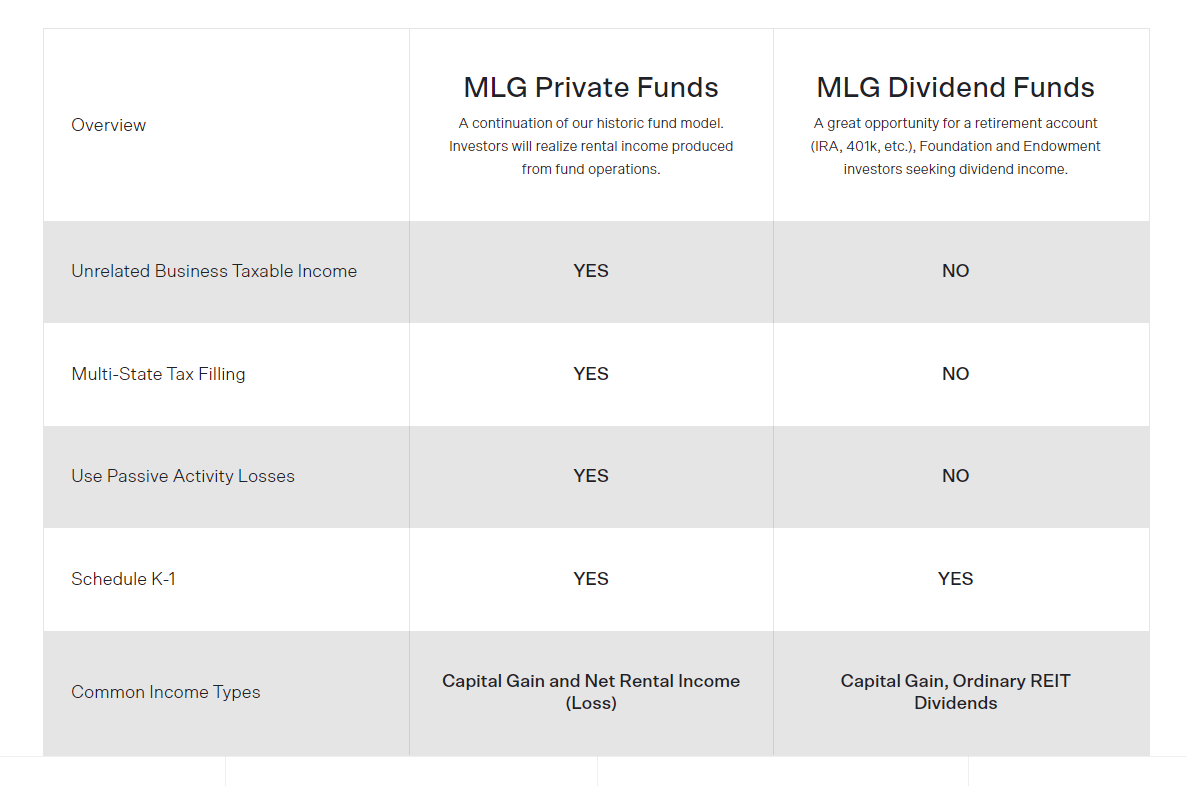As an investor in a diversified private real estate fund, you have likely come across the term “K-1” and have wondered both what it is and what it means to you. The K-1 is an important tax form that every investor in a partnership, including a real estate investment fund like the series of MLG Private Funds, receives annually, and is a very important document needed for filing your taxes.
Let’s break down what a K-1 is, and more importantly, how this document can impact real estate investors personal tax filings.
What is a Schedule K-1?
A K-1 is a tax form that is used to report a partner’s (investors) share of the income, deductions, credits, and other allocable items of a partnership. It is required to be filed by every partnership (including a real estate investment fund) with the Internal Revenue Service (IRS) and provided to each partner (investor) annually. The K-1 reports the investor’s annual share of the partnership’s taxable income and is used to prepare the investor’s individual tax return
What information is included on a K-1?
A K-1 form typically includes the following information (see an example 2022 K1 from the IRS):
- Your tax basis calculation (inside basis)
- Your annual share of the partnership’s taxable income, deductions, and credits
- Any cash distributions you received from the partnership during the tax year
- Certain states have their own K-1 reporting requirements that will be included with your K-1 package. Please make sure to consult with your CPA to ensure the proper state filings are being made
Why is the K-1 important for passive investors?
As a passive investor in a real estate investment fund, you are likely not actively involved in the management of the properties or the day-to-day operations of the fund. However, you are still considered a partner in the investment and, depending on the legal structure, are entitled to a share of the partnership’s income and deductions (i.e., passive taxable gains and taxable losses) for the tax year.
The information reported on your K-1 is used to report your taxable income allocation for the year and is fundamental in the preparation of your individual tax return. It is important to understand the information reported on your K-1 and how it affects your taxes so you can make informed decisions about your investments.
Understanding what your allocation of taxable income/(loss) will be throughout the lifetime of your investment will help you plan for the future and could create substantial tax efficiencies leading to greater and quicker wealth generation.
FAQ for MLG Capital Investors
- When are K-1s issued to investors?
K-1s for private investments generally are issued to investors after the date tax returns are due which causes investors to have to file extensions on their returns. At MLG, our 30+ accounting, tax and compliance team members seek to post all K1’s to fund investors no later than end of March, annually. This is no small feat as the generation of the document involves many 3rd parties.
- Does MLG file composite K-1s?
MLG does not seek to use composite tax returns for our private investment funds. A composite tax return would mean that MLG is filing and paying taxes in each state at the entity level on behalf of our investors, resulting in a simplified K-1 where investors do not need to file individual state taxes. There are however substantial disadvantages to using a composite tax filing in our opinion. States may utilize a graduated income tax rate. In many instances, these states tax investors at the highest possible rate regardless of their income reported in said state, and may cost you more money in tax!
If a composite return isn’t filed then the investor has to file a return and pay nonresident tax in states that they aren’t residents of. Investor may also file losses allocated to them which may be beneficial to use in future years of a fund life where more taxable income is reported to them. Read a recent blog by Senior Tax Compliance Manager, Tyler Taves, on how this works: Tax and Cash Flow Advantages With MLG.
- Will I have to file a tax return in multiple states?
That depends on if you are investing through the private fund or the dividend fund investment path. Let’s start by exploring the differences between the two paths to investing in Private Fund VI:
Which Fund Option Works for You?
MLG Private Fund VI LLC and MLG Dividend Fund VI LLC (together, the “Fund”) will invest side-by-side in each investment. Each have their respective attributes and have the same overall pre-tax investment objectives. Which one you invest in will depend on your personal financial situation. Learn More.

Depending on which investment option you select, you may have to file a return in multiple states. Our series of Private Funds specifically targets geographic diversification, with a goal of acquiring assets in 10-15 different states for each fund. Inherently, a handful of the states that we invest in do not have state income tax, which will reduce the number of states an investor needs to file taxes in.
What States Do Not Have State Income Tax?
States that do not have state income tax (as of 12/31/2022):
- Alaska
- Florida
- Nevada
- South Dakota
- Tennessee
- Texas
- Washington
- Wyoming
How Your K-1 Affects Your Personal Tax Strategy
Understanding the tax implications of your investments can help you generate new tax efficiencies that have the potential to decrease your overall tax bill. If you’re interested in learning how MLG leverages taxes to help our investors grow their wealth more efficiently reach out through this link or take a look at our blog: The Tax Efficient Power of Reinvestment.
We always recommend working with a CPA, estate planning attorney, or investment professional who can provide advice while taking into consideration your full financial picture. We are happy to share our history of tax-efficient returns to investors with your trusted advisors. If you are a current investor and have questions about the tax implications of your investment with us, please feel free to reach out to your MLG Capital contact or investors@mlgcapital.com.
FAQ: What Real Estate Investors Need to Know About K-1s
What is a Schedule K-1 and why do real estate investors receive it?
A Schedule K-1 is a tax document used to report an investor’s share of a partnership’s income, deductions, credits, and other allocable items. In a real estate investment fund structured as a partnership or LLC, every investor receives a K-1 annually.
What types of information are included on a K-1?
The K-1 typically includes items such as your tax basis (inside basis), your share of income, deductions, credits, and any cash distributions you received. It also contains state-specific reporting when required.
When can investors expect to receive their K-1s?
K-1s are often issued after the standard tax deadline, because partnership and fund accounting can take time. MLG aims to post all K-1s to investors by the end of March each year.
Do I need to file tax returns in multiple states because of a K-1?
It depends on how your fund is invested and which investment vehicle you choose. MLG invests in properties across multiple states, so in many cases you will need to file nonresident tax returns for those states where the fund earns income.
Does MLG use composite K-1s to simplify state filings?
No — MLG does not file composite tax returns on behalf of all investors. They prefer individual K-1s because composite returns can result in higher tax rates being applied to individuals and limit investors’ ability to use allocated losses over time.
This blog and associated materials are being presented for informational purposes only and is not an offer to sell interests in a security. A private real estate investment is subject to risks and uncertainty many of which are not outlined herein including, without limitation, risks involved in the real estate industry such as market, operational, interest rate, occupancy, inflationary, natural disasters, capitalization rate, regulatory, tax and other risks which may or may not be able to be identified at this time and may result in actual results differing from expected.
Private investments are highly speculative, illiquid, may involve a complete loss of capital, and are not suitable for all investors. Prospective investors should conduct their own due diligence and are encouraged to consult with a financial advisor, attorney, accountant, and any other professional that can help them to understand and assess the risks associated with any investment opportunity.
Past performance is not indicative of future results. Securities offered through North Capital Private Securities, member FINRA/SIPC. Advisory services offered through MLG Fund Manager LLC, an investment adviser registered with U.S. Securities & Exchange Commission.


